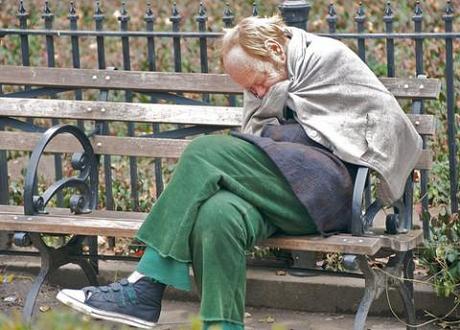
Homeless man. Photocredit: Ed Yourdon http://www.flickr.com/photos/yourdon/4299779303/sizes/m/in/photostream/
Panicked media reports circulated this week that nearly one in two Americans is officially considered poor by their government, according to statistics released by the US Census Bureau and reported by the Associated Press.
While that doesn’t exactly appear to be the case – the numbers are looking a bit more like one in three Americans – the desperate figures do reflect a shrinking middle class, an economy deeply wounded by festering unemployment, and fraying governmental safety nets.
The Associated Press explained that new Census statistics, based on a new measure that takes into account medical, commuting, and other costs of living to provide a “fuller picture”, put 97.3 million Americans in the low-income category. Together with the 49.1 million who fall below the poverty line, that’s 146.4 million, or 48 percent of the US population. Media across the globe picked up the story, usually under the headline “1 in 2 Americans poor”.
But NBCLA, a Los Angeles affiliate of NBC, claimed that it double-checked and came up with numbers indicting that the poverty figure is more like one in three Americans. The broadcaster says that Census officials told it the numbers are more like 49.9 million Americans, roughly 13.8 percent of the US population, are living below the poverty line and another 53.8 million, about 18 percent, are considered low income; all together, that’s about 32 percent of the population. Bad, but not as bad as half.
Even so, it’s depressing news that probably couldn’t come at a worse time: Not only has Christine LaGarde, head of the International Monetary Fund, warned that the global financial outlook is “gloomy” and that no nation is immune, but economists are also predicting that America is facing an epic 25-year recession.
So, is it all gloom and doom?
Some of these folks aren’t really poor. Even before the figures were investigated, more than a few folks took issue with this new “fuller picture” the Census Bureau provided. Robert Rector, a senior research fellow at the conservative Heritage Foundation, told the Associated Press that he questioned whether everyone considered poor or low-income by the US Census Bureau is actually suffering a true material hardship. Safety net programs put in place by the American government are great, but they may have gone too far: Some of these “poor” people live in nice homes, drive cars and “own wide-screen TVs”. At Opposing Views, FRC complained that the new Census Bureau formula that determined poverty was a “manipulation of the facts” and that there’s an “agenda” at work here. “President Obama and his liberal allies can’t accomplish their socialistic goals without expanding the definition of poverty. By casting a wider net on low-income people, he makes his ‘redistribution of wealth’ mantra more attractive and stokes the fires of class warfare.”
‘Outrageous’, says Iranian PressTV. PressTV, Iran’s state media, was more than happy to report on the news that poverty in the US had lately exploded, claiming, “Analysts believe the incredibly unequal top-down distribution of wealth in the US has formed an elite group who controls most aspects of the country’s affluence.” The broadcaster interviewed Brent Budowsky, a columnist with Congressional newspaper The Hill, who laid some of the blame at the feet of Republicans vetoing benefits programs and said, “There are too many poor people; there is not enough help for poor people; there is not enough jobs; there is not enough policies to create jobs… What we need to do is have far stronger programs, far stronger, to create jobs, to improve and strengthen, not weaken, the safety net.”
This ‘slump’ won’t end until 2031. Matthew Lynn, writing at MarketWatch, likened the current global financial straits to the circumstances that presaged the Long Depression of the 1870s, lasting until 1896. “The parallels with our own time are fascinating. German unification, and the adoption of the gold standard, had led to a boom in that country, and cheap German money had flooded Europe. Greece had just joined the Latin Currency Union, an ill-fated attempt to merge currencies across Europe. Banking had been deregulated, which was partly why so much German money was invested on the Vienna bourse. The telegraph created instant communications, allowing the European crash to spread to New York. The U.S. was industrializing, transforming the global economy as much as China has transformed the present era’s economy in the past decade. All those factors came together to create an almighty bubble, followed by an even worse crash. The slump that followed — although it is hard to measure these things precisely — lasted more than two decades. If the slump following the crash of 2008 is anything like that one, then this one is going to last until 2031.”
More on poverty, US economy
- Child poverty set to surge in UK
- Middle class homelessness on the rise?
- Introducing the universal credit
- Cyber Monday: Surprise – it’s a real thing!

